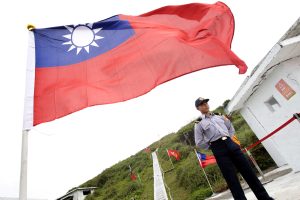Last month, the Japan Coast Guard (JCG) joined with its Taiwanese counterpart in joint drills off the coast of the Izu Peninsula in Shizuoka Prefecture and off the coast of the Boso Peninsula in Chiba Prefecture, Japan. This was basically training for salvage purposes, involving the sharing of information, assigning searches and coordination. The training was arguably conducted with a view to joint activities.
To facilitate the drills, the JCG informally dispatched a senior officer to Taiwan in June to coordinate with the director general of Taiwan’s Coast Guard Administration. These were the first drills of their kind to be held by Japan and Taiwan since diplomatic relations were severed in September 1972, and the Japanese media has been reporting that they were conducted with a so-called “Taiwan contingency” in mind.
However, exchanges between the Japanese and Taiwanese coast guards are hardly a recent phenomenon. Article 4 of the 2010 comprehensive memorandum of understanding on cooperation between the Interchange Association of Japan and Taiwan’s Association of East Asian Relations stated that “Both sides will strive to promote exchange and cooperation between Japan and Taiwan in maintaining maritime safety and order.”
A memorandum of cooperation in the field of maritime search and rescue between the two associations was subsequently concluded in December 2017. It calls for mutual cooperation, maintenance of communication mechanisms, mutual exchanges in areas of expertise and exchanging information on technologies related to maritime search and rescue, although it does not specifically mention joint training. And in February this year, a Memorandum of Understanding on Cooperation in Search and Rescue at Sea was concluded. The details have not been disclosed, but it is likely that the drills were based on this most recent memorandum.
On July 19, the day after the training, the Chinese Foreign Ministry held a press conference on the drills. At the conference, newly appointed spokesperson Lin Jian asserted that “[we] strongly deplore and firmly oppose” the exercises and that China will conduct “strict negotiations” with Japan. Moreover, he pointed out that when it comes to the question of Taiwan, Japan is supposed to adhere to a principle of opposing “two Chinas,” “one China, one Taiwan,” and “Taiwan independence.” Maritime drills for salvage purposes between the two coast guards are subject to this principle. This position is in accordance with China’s apparent stance recently of decrying any form cooperation with Taiwan’s Democratic Progressive Party (DPP) government.
In fact, notwithstanding China’s claim that Japan is supposed to have agreed to opposing “two Chinas,” “one China, one Taiwan,” and “Taiwan independence,” this is nowhere to be found in the four basic documents between Japan and China. The 1998 Japan-China Joint Declaration (on Building a Partnership of Friendship and Cooperation for Peace and Development) states that “The Japanese side continues to maintain its stand on the Taiwan issue which was set forth in the Joint Communique of the Government of Japan and the Government of the People’s Republic of China and reiterates its understanding that there is one China,” while the 2009 Japan-China Joint Communiqué (on Comprehensive Promotion of a Mutually Beneficial Relationship Based on Common Strategic Interests) also merely states that “Regarding the Taiwan issue, the Japanese side again expressed its adherence to the position enunciated in the Joint Communique of the Government of Japan and the Government of the People’s Republic of China,” without making any references to “two Chinas,” “one China, one Taiwan” or “Taiwan independence.”
The problem is the Japan-China Joint Communiqué of September 1972. It states that Japan understands and respects China’s claim that Taiwan is an inalienable part of the People’s Republic of China, also adding that Japan “firmly maintains its stand under Article 8 of the Potsdam Proclamation.” What the Chinese are focusing on is the second part.
According to the former ambassador to the United States, Kuriyama Takakazu, Taiwan’s status is undecided based on this Article 8 of the Potsdam Proclamation, but at the same time “If the Government of the People’s Republic of China is recognized as the sole legitimate government representing China from the standpoint of ‘one China,’ then the ‘Republic of China’ mentioned in the Cairo Declaration refers to the China inherited by the People’s Republic of China. As such, a position based on Article 8 of the Potsdam Proclamation, which purports to implement the Cairo Declaration, means recognizing the return of Taiwan to China, meaning the People’s Republic of China.”
Moreover, added Kuriyama, if Japan recognizes the People’s Republic of China as the sole legitimate government of China, “Japan recognizes that Taiwan should be returned to China as represented by the Government of the People’s Republic of China” which “means that Japan does not recognize ‘two Chinas,’ ‘one China’ or ‘one Taiwan’ (that is, Japan does not support Taiwan independence).”
The current Japanese government does not necessarily support Kuriyama’s view, but Beijing appears to be using the interpretation that Kuriyama and others have suggested.
At present, the Chinese are raising issues about “interpretations” especially relevant to Taiwan and Okinawa of the Cairo Declaration, the Potsdam Proclamation, the San Francisco Peace Treaty, and the four basic documents between Japan and China, which means that this kind of issue of historical recognition has been raised once again with regard to the recent coast guard cooperation.
Nonetheless, the impact of raising such issues on Japan-Taiwan relations will be limited. It should be noted that the developing cooperation between Japan and Taiwan is not limited to maritime issues, as progress is also being made in a wide range of areas, from economic relations to human exchange and technological cooperation.

































